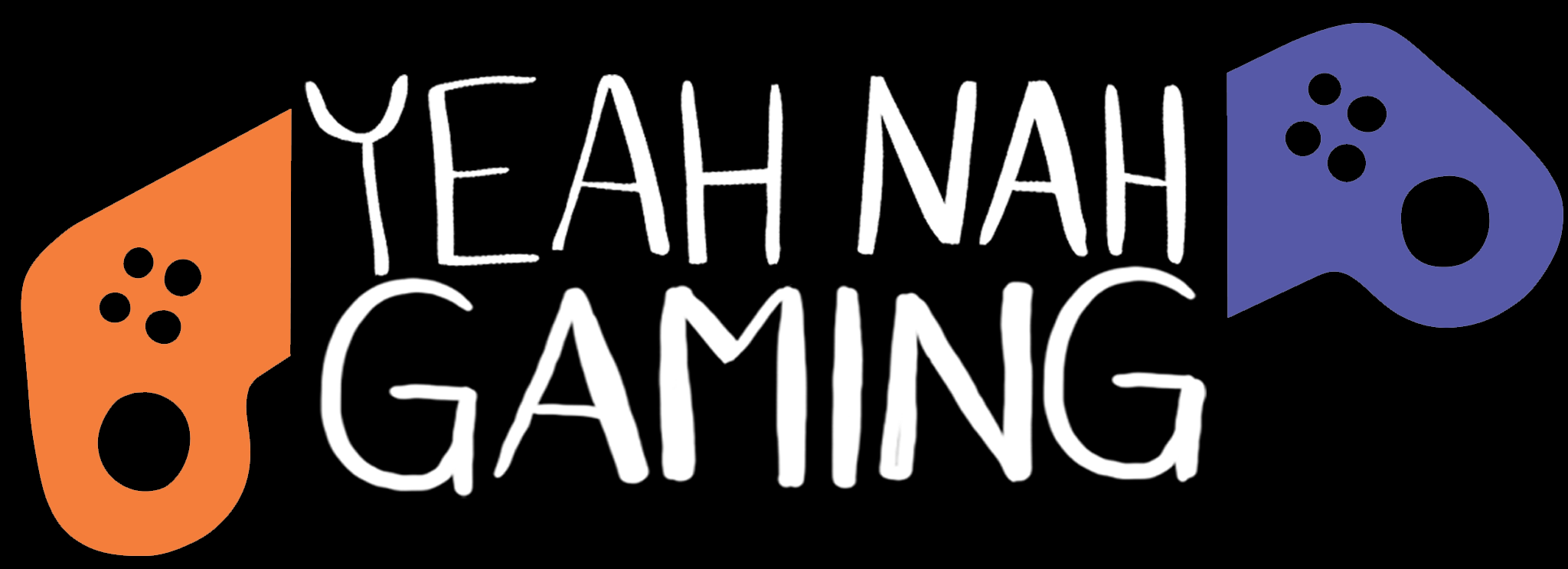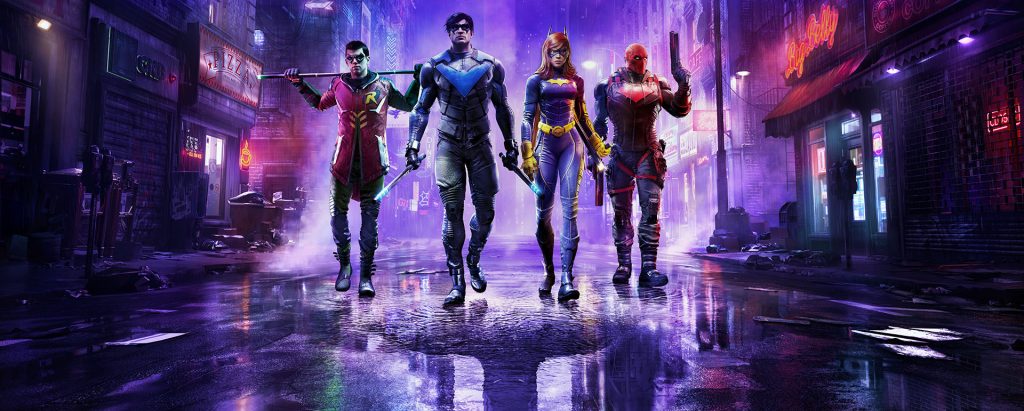I’m just going to say this up front: I don’t really care about Batman. To me he’s always been a vehicle for stylish action movies or cool open-world video games. Aside from that, he’s just a libertarian power fantasy—a moneyed man that will do what that state can’t. And it’s precisely for that reason that I was interested in checking out WB Montreal’s Gotham Knights.
Because Batman is dead.
While Rocksteady’s 2009 smash hit Arkham Asylum would establish the tone and mechanics for every Batman game to come—a series WB Montreal themselves contributed to with 2013’s Arkham Origins—Gotham Knights is a standalone title, removed from the burden of continuity that damn near a decade’s worth of storytelling imposes. It’s fitting too that, as the developers are trying to find an identity outside of the Bat’s shadow, so too is the game’s vigilante cast of twenty-somethings. It’s a shame then that in its search, the game is instead more memorable for its extraneous systems, technical issues, and scattershot writing.

At its core, Gotham Knights is an open-world action game. While it still sports the very magnetised, combo-heavy combat of its predecessors, the game places more of an emphasis on dodging attacks than it does countering—in fact, there’s no counter button whatsoever. The result is some flashy, cape-swishing fights that look straight out of a choreographed movie.
Depth comes from Momentum Abilities, which build up as you land attacks and perform perfect dodges. Build enough meter and you can cash it in for a special attack like an unblockable series of strikes, or an aerial storm of batarangs—you get the idea. Combine this with ultimate abilities and skill trees—unique ones for each of the four crimefighters (Batgirl, Robin, Nightwing, and Red Hood)—and there’s quite a lot to sink your teeth into.
Muddying this somewhat is a gear system draped over the entire experience. As you beat up crooks across Gotham, you’ll find crafting resources or equipment. Each piece of gear has a rarity and power rating associated with it, and equipping it increases your damage output and defences. All well and good, but the game isn’t that difficult. In the few occurrences where I didn’t have the right elemental effect to best a certain class of enemy, all it really meant was that the fight took a few seconds more. I’m sure tweaking my crit chance and resistances so minutely is having an effect somewhere, but at a point it just feels like I’m tightening the nuts and bolts on a tank—probably important, but largely meaningless when the machine underneath is just so fucking big. It’s a shame too, because all the different gear sets are cool to look at, boasting what are (I can only assume) different styles from the multitude of Bat-adjacent media available. Thankfully you can transmog gear sets to look like any you’ve gained or crafted.

The entire system becomes moot however by the time you start unlocking heroic and legendary gear, because it levels up as you use it. In my final eight hours of the game, I only swapped out my armour once, and that was because the growth-rate of my older gear wasn’t matching my current level. It’s hard not to look at the entire system and be a bit cynical about it: what better way to find your quantum of the attention economy than with a perpetual loot treadmill? Number go up: now you’ve got investment baby—now you’ve got engagement. The Destiny-ification of games like Assassin’s Creed during Gotham Knights’ development no doubt emboldened top-level decision makers.
Of course, Gotham Knights’ major selling point is its co-op. You can tackle street crimes or go through the entire story campaign online, but despite there being four playable characters, the game only allows you to join forces with one other player. The game will feature a 4-player mode called Heroic Assault, but that won’t launch until later next month.
The co-op is fine, but nothing transformative. It can be cool seeing another masked buddy doing sick combos on the other side of an arena, but that’s largely where it starts and ends. Some characters can buff others’ damage, but if you’re looking for elaborate team-up combos, you aren’t going to find them. If anything, I often found my co-op partner knocking the enemy I was focusing on out of my combo string, which would leave me flailing at the air.

But the online is only as good as the in-game performance will allow, and over my playthrough—where I completed the campaign, all major side missions, and a good chunk of repeatable street crimes—I was met with more technical issues than I have seen in a AAA game in a long time. On a foundational level, the game looks incredible—with Gotham realised in different hues and weather effects depending on the night you’re patrolling, and which villain is doing what. While the framerate was mostly smooth, there was a near-constant stuttering in the open-world, and tweaking my settings never made it go away. My PC blows the recommended specs out of the water (I’m running a 3080 Ti, a 12th gen i9 processor, 32GB of RAM, and running the game from an NVMe SSD), so I’m dreading the type of experience people with more modest machines will have.
What’s worse is the repeated crashes-to-desktop, which in my 20-hours of playtime I’d say—conservatively—occurred about 30 times. Interestingly, the bug only ever manifested when loading into smaller environments, like the safehouse or cordoned-off side missions. To make matters worse, I suspect the random people I matched with online were having the exact same bug, as the majority of my disconnects occurred whenever the host launched into a side mission. Mix this with general soft-locks (enemies not spawning, stopping progression), AI not turning on, and some quest markers refusing to clear from the map, and Gotham Knights starts to feel like it came out of the oven a bit early.

Unfortunately, the writing isn’t enough to help overlook these flaws either. The game starts out with an investigation into the Court of Owls—a group posed as this big, sprawling cabal of high-society villains. Cool in concept, but they’re largely forgotten when the story breaks down into a boring plot about a super serum. The cast of plucky young crusaders doesn’t do anything to engender good will either, with most of the dialogue boiling down to hollow, nonsensical platitudes about hope, justice, or duty, or—in the worst case—some variant of the phrase “we’ve got this.” If there’s one thing I hoped we—as a society—would have learnt from Mass Effect: Andromeda, it would’ve been to leave that turn of phrase buried in the dirt. When your cast says it ad nauseum they don’t sound endearing or green, they just sound incompetent.
The best parts of the game, however, are the side investigations, each one centred around a super villain. When you’ve done enough legwork, you unlock a lengthy mission that ends in a boss fight—and most of these are incredibly well done (the final Harley Quinn fight is a real standout). They uniquely understand that superhero stuff is as much about the villains as it is the heroes, and it makes each villain the star. But these missions feel so divorced from the broader game—not just narratively (which I don’t have a problem with), but functionally too; they don’t occur organically within Gotham, you boot them from a separate menu. Content as good as that shouldn’t feel siloed off.

Gotham Knights is a game about stepping out of Batman’s shadow—not just for its troupe of caped crusaders, but for its developer too. While WB Montreal have crafted a solid action game that casts off some of Bruce Wayne’s looming presence, it’s just far too marred by extraneous loot systems, technical woes, and forgettable writing to wholly recommend. And given how cutthroat Warner Bros. has proven itself to be over the last few weeks—butchering entire networks and catalogues of shows with a hatchet man’s glee—I can’t help but feel that the game won’t get the support it desperately needs.
Reviewed on PC. Originally published on Shindig.
Gotham Knights is a game about stepping out of Batman’s shadow—not just for its troupe of caped crusaders, but for its developer too. While WB Montreal have crafted a solid action game, it’s just far too marred by extraneous loot systems, technical woes, and forgettable writing to wholly recommend.


1 Comment
Pingback: Payday 3 is out now on Xbox Game Pass - Yeah Nah Gaming